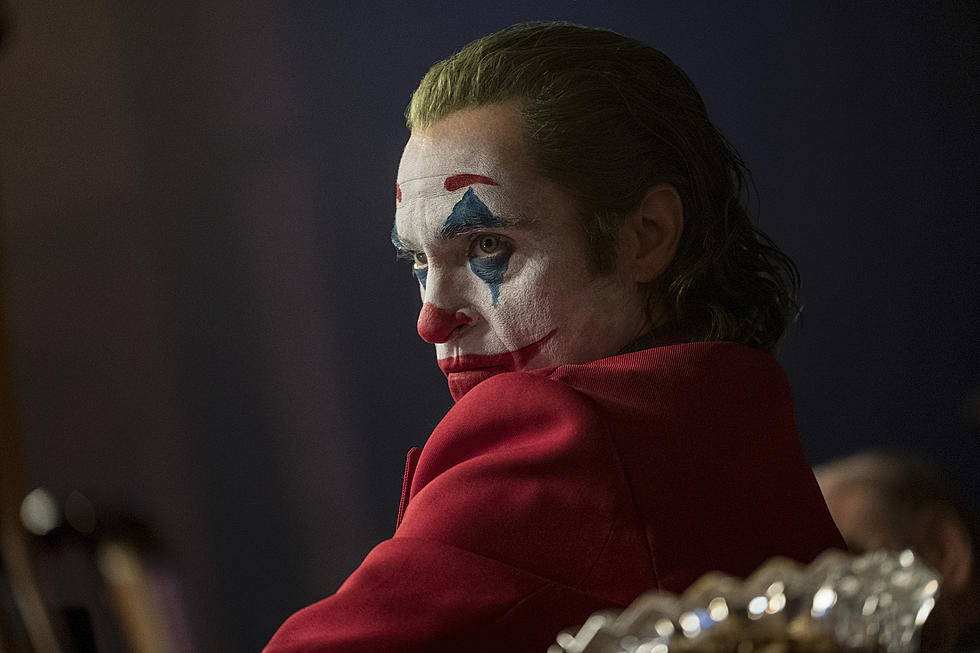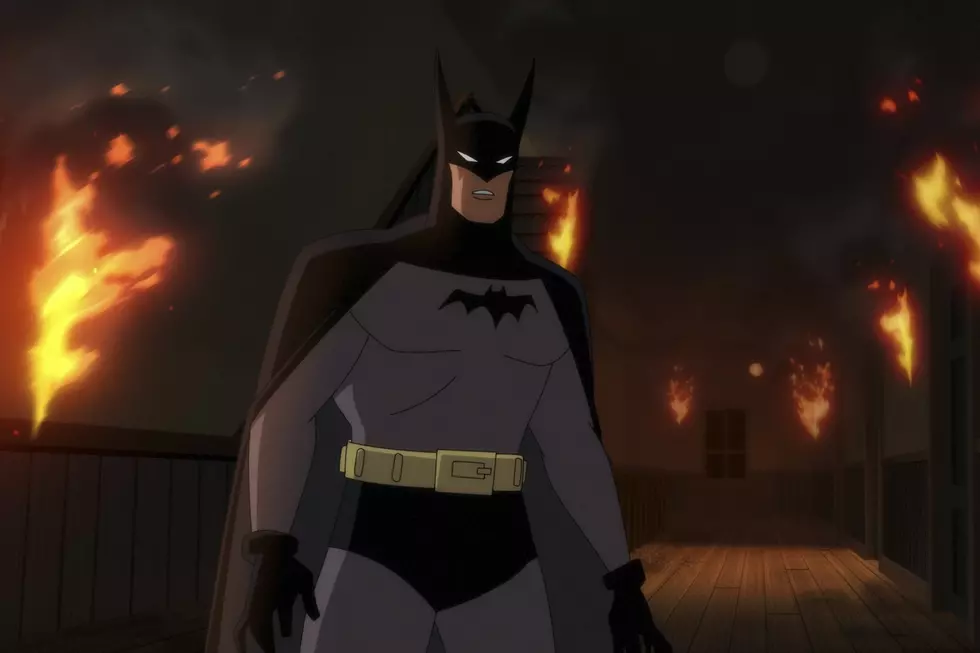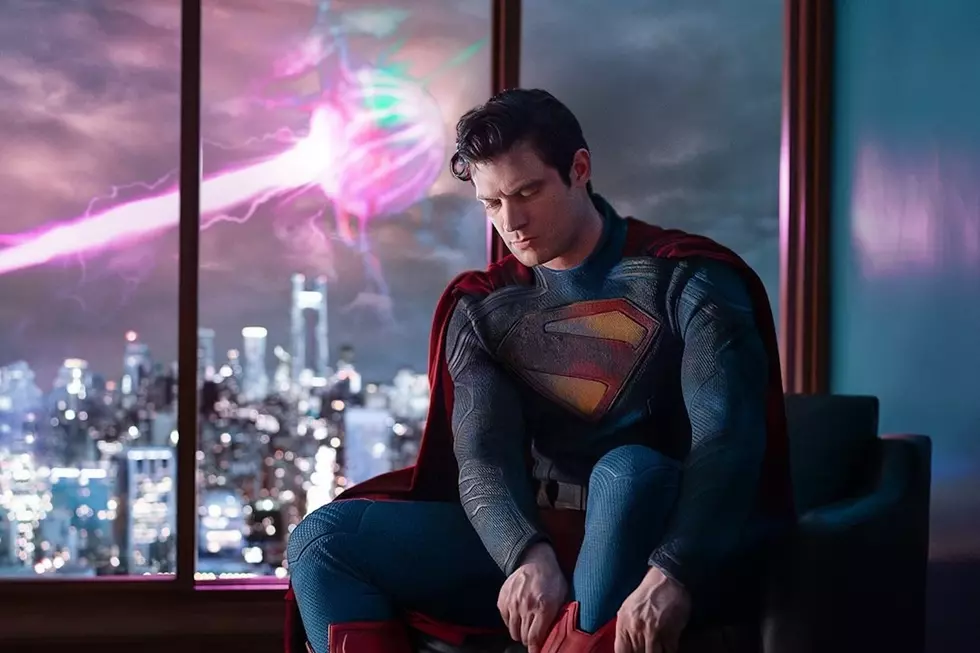
‘Joker’ Review: That Joke Isn’t Funny Anymore
Is the Joker a character worthy of sympathy? Todd Phillips seems to think so. His Joker doesn’t treat Batman’s arch-nemesis as a criminal mastermind or a fiendish super-villain, but as a victim; a loser literally and figuratively beaten down by life until he can’t take any more. Unlike the Joker of countless DC Comics, TV shows, and movies, who always had a legion of goons waiting to fight the Dark Knight at his say so, this new movie’s Joker is essentially alone in the world. In this film, he’s the one on the receiving ends of multiple beatings. He’s also yelled at by strangers, insulted by women, and threatened by his boss even though — at least to that point in the story — he’s done nothing wrong. Presumably these scenes are present to help us understand this man. But they come awfully close to absolving him.
He’s played, in a typically intense and invested performance, by Joaquin Phoenix. Before he becomes the Joker, he’s known as Arthur Fleck, a hapless, heavily medicated bachelor who still lives at home with his ailing mother (Frances Conroy). Arthur makes ends meet as a clown for hire, working parties and other events. Steady work is tough to come by, though. In the film’s first scene, Arthur is twirling a sign advertising a store that’s going out of business. Some thugs steal the sign, and when Arthur chases after them, they ambush him and kick the crap out of him. Then his boss accuses him of stealing the sign. And this is about as good as things get for Arthur, who also suffers from a medical condition that causes him to laugh uncontrollably at inappropriate moments.
Taking as many cues from Martin Scorsese as Bill Finger, Phillips sets Arthur on a collision course with his favorite late night talk show host, Murray Franklin — who, in one of the many overt homages to Scorsese’s work, is played by Robert De Niro. 36 years ago, De Niro, played the role of delusional aspiring comic obsessed with Jerry Lewis’ TV star in The King of Comedy. Seven years earlier, De Niro played Travis Bickle in another obvious touchstone for Phillips’ Joker, Scorsese’s Taxi Driver, which is about the gradual mental deterioration of a sick man living in a dirty, rotting city. Like Travis, Arthur also encounters a woman he becomes infatuated with; in his case, a neighbor named Sophie (Zazie Beetz), with whom he shares a brief moment of mutual exasperation.
Phillips, who directed, produced, and co-wrote the film with Scott Silver, clearly understands the plots of these Scorsese movies, but not their souls. Joker isn’t a film about a misanthrope, it is a misanthropic movie. While there are vague notions of political subtext in the citizens of Gotham City — who are denounced as “clowns” by wealthy businessman Thomas Wayne (Brett Cullen) and then embrace the insult, deplorables-style, and begin wearing clown masks as they protest in the streets — any satire or social commentary is so tame and murky as to be nonexistent. (Joker himself refuses to embrace any sort of political philosophy in his big climactic speech, which again places the blame for all of his actions on the world that mistreated him.) Phillips may have set out to make a modern-day Scorsese picture using the iconography of superhero comics, but what he wound up with feels more like something Travis Bickle would have taken Betsy to, and then sat nodding at the screen in agreement after his date ran for the exit. It depicts the world basically as Travis saw it: A hell filled with scum.
Just as much of Joker’s narrative feels recycled from old Scorsese pictures, Joaquin Phoenix’s Arthur feels like a pale shadow of his previous work in similar films about violent wanderers like The Master and You Were Never Really Here, which are tougher and smarter about these kinds of men and how society shapes them. As has become something of a trademark, Phoenix once again completely reshaped his physique for the role; as Arthur, he’s a drawn, skeletal figure who moves his lanky frame in ways that recall Marshall Rogers’ famous drawings of the Joker.
Phoenix is one of our very best actors, and even in a movie as dreary as Joker, he is still compelling. His peculiar choices as Arthur’s breakdown accelerates are particularly disturbing. Although Arthur dreams of an appearance on Live With Murray Franklin, actual humor eludes him; he observes and mimics the behavior of comedians like an alien trying to blend in to society. The movie around Phoenix, though, never matches the complexity of his performance. It’s a simple, grim slog.
Based on the internet’s reactions to other recent DC Comics movies, it seems there are those who will admire Joker for its pharmaceutical grade nihilistic bleakness. Good or bad, it’s undeniably one of the most depressing comic-book movies ever made. (It’s also got one of the most depressing comic-book movie scores, an endless dirge of droning strings by Hildur Guðnadóttir.) The calls from some corners to ban the film because it could incite violence give the movie too much credit. It’s not irresponsible. It’s just immature.
The lack of a Batman in Joker — or anyone who might oppose Arthur — made me think of the famous line from the end of The Dark Knight (a movie that practically looks like the Adam West TV show compared to Joker) about how Batman is “the hero Gotham deserves, but not the one it needs right now.” Most versions of Gotham City are pretty dark, but Joker’s Gotham appears to be beyond redemption. While we certainly don’t need the Joker, given the general state of the world in 2019, he may be the hero we deserve.
Additional Thoughts:
-One small detail I liked was the white paint residue that’s always smeared on Arthur’s neck and cheeks. Within the story, we understand he’s not very careful removing his clown makeup after work. Onscreen, it almost looks like the Joker is already lurking within him, and he’s starting to bust out.
-For a movie that includes the phrase “super rats,” it does not include nearly enough super rats.
-As an alternate viewing suggestion instead of Joker, you might consider watching Fritz Lang’s M.
-Although his role is small, De Niro is good as Murray Franklin. And it’s stunt casting that works, since De Niro’s transition from a Rupert Pupkin to a Jerry Langford lends an added layer of poignance to the film. To quote another line from The Dark Knight “you either die a hero or you live long enough to see yourself become the villain.”
Gallery — Every Movie Theater Candy Ranked From Worst to Best:
More From ScreenCrush









